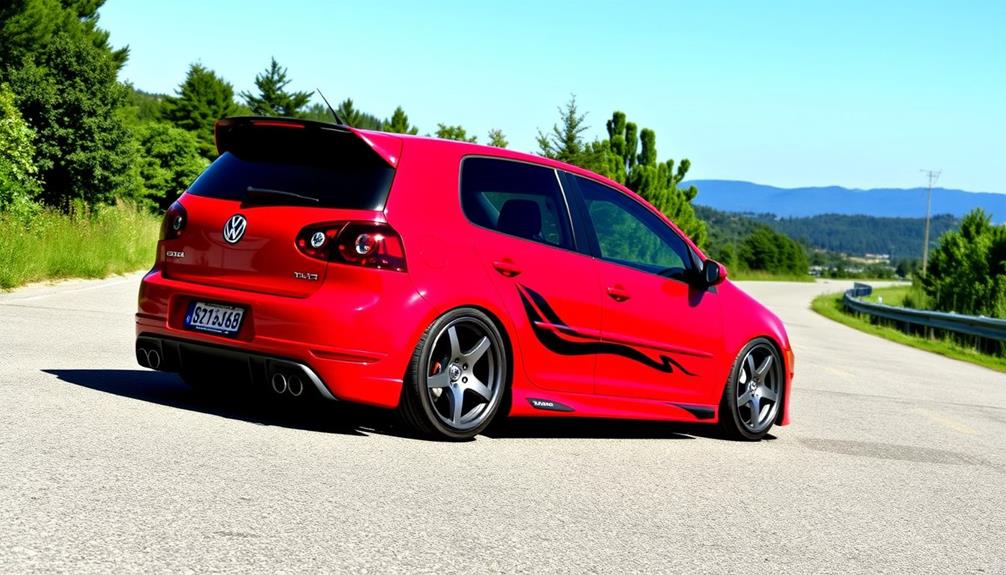Tuning your 2009 Volkswagen Jetta can really revamp its performance and style. Start with engine modifications like ECU tuning or a cold air intake to boost horsepower and torque. Consider upgrading to a performance exhaust system for improved sound and efficiency. Don't forget about suspension upgrades to enhance handling and ride quality. For aesthetics, body kits and custom wheels can make your Jetta stand out on the road. With careful planning and the right parts, you can release your sedan's full potential. Discover the best upgrade options and tips to elevate your driving experience even further.
Key Takeaways
- Engine remapping and cold air intakes can significantly boost horsepower and torque in the 2009 Jetta, enhancing performance.
- Upgrading to performance exhaust systems reduces back pressure, improving exhaust flow and engine sound.
- Suspension upgrades, such as coilovers, enhance handling and provide a sportier driving experience.
- Aesthetic modifications like body kits and custom wheels improve the sedan's visual appeal and aerodynamics.
- Regular maintenance and quality aftermarket parts ensure long-term reliability after tuning modifications.
Overview of the 2009 Jetta
The 2009 Volkswagen Jetta stands out with its stylish design and comfortable interior, making it a smart choice for those seeking both aesthetics and practicality.
With spacious seating for five passengers and a generous trunk capacity of 15.5 cubic feet, you can easily accommodate family trips or daily commutes.
Under the hood, you've got options: the 2.5L inline-5 engine delivers a solid 170 horsepower, while the GLI trim offers a more spirited drive with its 2.0L turbocharged inline-4 engine.
This model is well-regarded for its solid build quality and exceptional handling, positioning the 2009 Volkswagen Jetta as a top contender in the compact car segment.
Safety is a priority, too, with standard features like front and side airbags, electronic stability control, and anti-lock brakes, all contributing to impressive safety ratings.
Whether you're traversing city streets or hitting the highway, the 2009 Jetta provides a comfortable ride, blending style, performance, and safety seamlessly.
If you're in the market for a reliable sedan, this model deserves your consideration.
Popular Tuning Options

For those looking to elevate the performance of their 2009 Volkswagen Jetta, numerous tuning options can greatly enhance both power and driving experience.
One popular choice is engine remapping and ECU tuning, which can markedly boost horsepower and torque while optimizing fuel economy. Cold air intakes are another favorite, improving airflow to the engine and enhancing throttle response, yielding gains of 10-15 horsepower.
If you're after a more aggressive sound and increased performance, consider upgrading to a performance exhaust system from brands like Borla or MagnaFlow. These options not only amplify engine output but also give your Jetta a sporty growl that enthusiasts love.
Additionally, suspension upgrades, including coilovers or sway bars, can make a noticeable difference in handling and ride quality, enhancing cornering capabilities.
For those seeking maximum power, turbocharger upgrades are highly sought after. When paired with supporting modifications, these can elevate your Jetta's output by 50-100 horsepower, providing an exhilarating driving experience.
Each of these tuning options not only boosts power but can also positively impact fuel economy, making your sedan both fun and efficient on the road. Additionally, with Porsche Panamera Turbo tuning, you can unlock even more performance potential while optimizing the engine’s efficiency. By fine-tuning various components, such as the ECU or exhaust system, you can achieve a perfect balance between exhilarating speed and fuel savings. This makes your drive not only more enjoyable but also more economical in the long run.
Performance Upgrades Explained
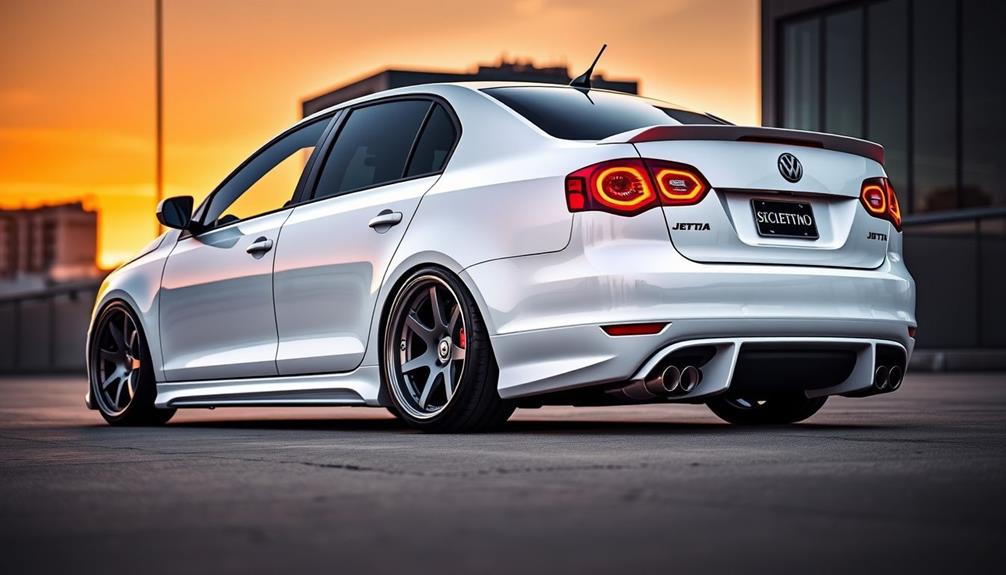
While exploring performance upgrades for your 2009 Volkswagen Jetta, you'll find various options that can greatly enhance your driving experience. One of the most effective methods is engine tuning, which can greatly boost your horsepower and torque. You can opt for professional services or try out DIY plug-in tuners designed for compatibility with your stock engine.
Another popular performance upgrade is installing a cold air intake system. This modification improves airflow to the engine, potentially increasing efficiency and giving your Jetta a more aggressive sound.
Upgrading to a performance exhaust system, like those from Borla, can further enhance your ride by reducing back pressure and improving exhaust flow, while also providing that sporty sound you crave.
Don't overlook suspension kits specifically designed for the Jetta. These kits enhance handling and ride quality, giving you a sportier, more stable experience, especially in corners.
Finally, consider turbocharger upgrades, which can grant considerable boosts in engine power and responsiveness, making your Jetta more competitive in performance settings.
With these performance upgrades, you'll transform your sedan into a thrilling driving machine.
Aesthetic Enhancements

When you think about aesthetic enhancements for your 2009 Volkswagen Jetta, body kits and wheel upgrades are key players.
Custom wheels in 17 or 18 inches can elevate your car's stance, while body kits give it an aggressive look that turns heads.
Together, these modifications can transform your Jetta from ordinary to extraordinary.
Body Kits Options
Transforming your 2009 Volkswagen Jetta's look is easy with a variety of body kit options that enhance its sporty aesthetic.
These body kits not only boost your car's visual appeal but also improve aerodynamics, ensuring you get noticed on the road.
Here are some popular options you might consider:
- Front Lip Spoilers: These add an aggressive touch while improving airflow, enhancing performance and style.
- Side Skirts: They create a sleek profile, making your Jetta appear lower and more streamlined.
- Rear Diffusers: These improve airflow under the vehicle, contributing to better stability at higher speeds.
- Custom Vinyl Wraps: Pairing wraps with body kits allows for unique color schemes and finishes, letting your personality shine through.
When choosing body kits, consider materials like fiberglass, polyurethane, or carbon fiber, each offering different levels of durability and weight savings.
Remember to check local regulations as some modifications might require adherence to specific guidelines.
With the right body kit, you can truly revamp your Jetta into a standout sedan!
Wheel and Tire Upgrades
How can you elevate the look of your 2009 Volkswagen Jetta? Upgrading your wheels and tires is a great way to make a statement while enhancing performance. Consider swapping to 17 or 18-inch wheels; not only do they boost your car's aesthetic appeal, but they also improve handling and steering response, making your drives more enjoyable.
Aftermarket wheels come in a variety of designs and finishes, allowing you to showcase your personal style. Lightweight alloys are popular choices, as they reduce unsprung weight for better performance.
Additionally, selecting tires with a wider profile can enhance grip and cornering stability, while low-profile options give your Jetta a sportier, more aggressive stance.
Don't overlook aesthetic enhancements like custom wheel colors or finishes—matte or gloss can dramatically change your car's appearance, helping it stand out wherever you go.
Just remember to verify compatibility with your vehicle's specifications and consider the impact on ride comfort and handling dynamics. Investing in the right wheels and tires not only transforms your Jetta's look but also elevates your driving experience.
Installation Process for Mods

Before diving into the installation process for modifications on your 2009 Volkswagen Jetta, gather all necessary tools and parts to guarantee compatibility. This guarantees a smoother installation experience and helps you avoid any surprises.
Follow specific instructions for each mod, especially when it comes to lowering springs, as proper installation is crucial for performance and safety.
Here's a quick checklist to help you get started:
- Diagnostic tool for engine tuning.
- Cold air intake kit with a secure filter.
- Exhaust system with appropriate sealants.
- Basic hand tools (wrenches, screwdrivers, etc.).
For engine tuning, connect the diagnostic tool to monitor engine parameters. Follow the tuning device instructions closely for seamless integration.
When installing the cold air intake, verify the new filter is attached securely and route the intake tube carefully.
Upgrading the exhaust system involves loosening the clamps and hangers of the stock setup, removing it, and installing the new system while ensuring proper sealing.
Cost Breakdown for Upgrades
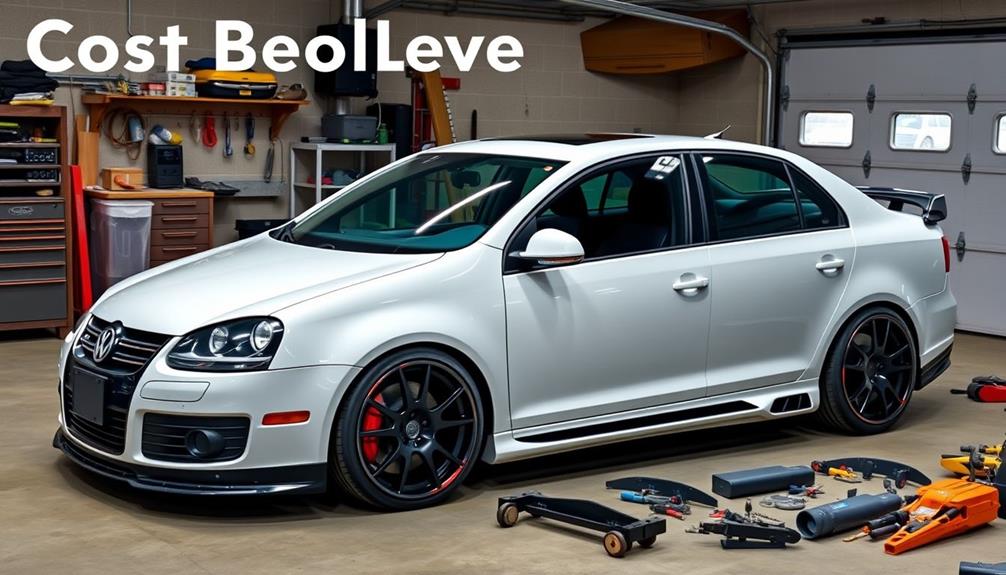
Upgrading your 2009 Volkswagen Jetta can be a rewarding investment, but it's essential to understand the costs involved. The cost breakdown for upgrades varies widely based on your choices.
For instance, basic ECU tuning typically runs around $500, including labor, and can greatly enhance your engine's performance. If you're considering custom wheels and tires, you'll likely spend between $1,200 for used sets and more for new options, depending on the brand and specifications.
Installing a cat-back exhaust system starts at about $600, but keep in mind that labor costs might add to that if you're not doing it yourself. A cold air intake system can improve airflow and efficiency, generally costing between $200 to $400.
User Experiences and Reviews

When tuning your 2009 Volkswagen Jetta, you'll likely notice significant performance gains, especially after ECU remaps or exhaust upgrades.
However, some users have faced installation challenges that can complicate the process.
It's also essential to take into account long-term reliability, as feedback from fellow Jetta owners can help you make informed decisions about your upgrades.
Performance Gains Observed
Many users of the 2009 Volkswagen Jetta have reported impressive performance gains following various tuning modifications.
These enhancements not only boost your driving experience but also make your sedan more enjoyable on the road.
Here are some notable performance gains observed:
- Horsepower and Torque Increases: Many drivers have seen jumps of up to 30 horsepower after installing cold air intakes and tuning chips, greatly improving acceleration.
- Enhanced Exhaust Flow: A cat-back exhaust system is often praised for elevating engine sound and maximizing exhaust flow, leading to better acceleration and a sportier feel.
- Improved Handling: Suspension upgrades, like sway bars and coilovers, have transformed handling dynamics, resulting in a more responsive and enjoyable driving experience.
- Better Fuel Efficiency: Users report that proper ECU tuning can enhance throttle response and fuel economy, with some noting a 10% increase in mileage.
These performance gains observed by Jetta owners highlight the potential for your vehicle to become a more powerful and efficient machine.
Just remember, professional installation is key for ideal results and reliability.
Installation Challenges Faced
During installation, users of the 2009 Volkswagen Jetta often face a variety of challenges that can complicate the tuning process. One of the most common installation challenges arises when fitting cold air intakes. Many enthusiasts struggle to secure the intake tubing within the tight confines of the engine compartment.
Performance exhaust system installations present another hurdle, as aligning the exhaust hangers frequently requires adjustments to prevent rattling.
Upgrading suspension components can be particularly tricky; you might need specialized tools to remove stock parts, and aligning the suspension afterward can add to the complexity. Additionally, some users have encountered compatibility issues with plug-in tuners, highlighting the importance of confirming that your tuning device is specifically designed for the 2009 Jetta. This step is vital to avoid potential wiring and software conflicts.
Lastly, while LED lighting upgrades can greatly enhance your vehicle's aesthetics, they come with their own set of installation challenges. Proper wiring and a solid understanding of your Jetta's electrical system are essential to avoid short circuits and guarantee a smooth installation.
With patience and the right tools, you can tackle these challenges head-on and enjoy your upgraded Jetta.
Long-term Reliability Insights
Installation challenges can often lead to concerns about long-term reliability, but user experiences with the 2009 Volkswagen Jetta show that with the right approach, you can maintain a dependable vehicle.
Many owners have successfully navigated the tuning process while ensuring their car remains reliable over the years.
Here are some insights from fellow Jetta enthusiasts that emphasize long-term reliability:
- Regular Maintenance: Prioritize timely oil changes and use synthetic oils for better engine protection.
- Quality Components: Choose reputable aftermarket parts for any performance upgrades to avoid compromising reliability.
- Monitor Engine Parameters: Keep an eye on engine metrics during and after tuning to prevent long-term damage.
- Cooling System Care: Maintain the original cooling system and address any leaks promptly to prevent overheating issues.
Maintenance Considerations

Proper maintenance is essential for keeping your 2009 Volkswagen Jetta running smoothly and efficiently. Regular oil changes are critical, especially with the TDI engine. Using high-quality synthetic oils can enhance engine protection and performance.
Don't overlook the importance of a preventive maintenance schedule that includes checking and replacing fuel filters to guarantee optimal fuel flow and prevent contamination.
Monitoring tire pressure and tread wear is another key aspect of maintenance. Rotate your tires every 5,000 to 7,500 miles to maintain handling and fuel efficiency.
Regular inspections of the brake system, including pads and rotors, are essential not only for performance but also for safety. Pay attention to any signs of wear and address them promptly.
Lastly, keep a close eye on the timing belt replacement interval, which typically falls between 60,000 to 100,000 miles. This maintenance task is critical, as neglecting it could lead to severe engine damage.
Local Marketplace Insights
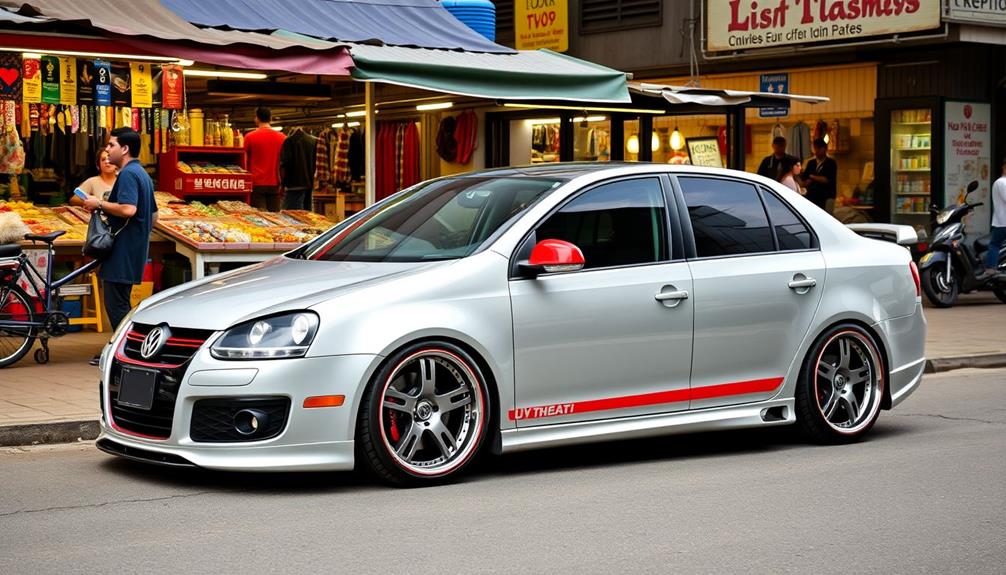
When you're on the hunt for parts for your 2009 Volkswagen Jetta, local marketplaces like Craigslist can be a goldmine for cost-effective upgrades.
You can find everything from used wheels to aftermarket performance parts, often at prices that won't break the bank.
Just remember to verify seller credibility to guarantee you're getting quality items for your ride.
Local Parts Availability
Finding local parts for your 2009 Volkswagen Jetta can be a game changer, especially if you're looking to tune or upgrade your ride without breaking the bank.
Understanding your budget is essential for making informed decisions, as it allows you to allocate funds effectively for budgeting for upgrades. Local parts availability makes it easier than ever to find what you need while saving money.
Here are some effective strategies to explore:
- Online Marketplaces: Websites like Craigslist often feature second-hand parts specifically for the Jetta, allowing you to snag cost-effective options.
- Local Classifieds: You can find popular aftermarket components, such as custom wheels and exhaust systems, in your area, helping you compare prices and quality easily.
- Car Enthusiast Groups: Engaging with local clubs can lead you to trustworthy sellers and recommendations, ensuring you buy reliable parts compatible with your Jetta MKV.
- Tuning Shops: Many local shops offer specialized services and have connections to suppliers, making it easier to find hard-to-find parts.
Cost-Effective Upgrades Options
Exploring cost-effective upgrade options for your 2009 Volkswagen Jetta can greatly enhance your driving experience without straining your wallet.
Local marketplaces like Craigslist are goldmines for second-hand wheels and tires, typically priced around $1,200. This offers significant savings compared to brand-new options. Before making a purchase, it's essential to research aftermarket parts to avoid overspending; popular upgrades can vary widely in price and quality based on local availability.
Many community members share their finds on these platforms, so don't hesitate to tap into that network. Just remember to verify seller credibility to confirm you're making quality purchases.
Keep an eye out for seasonal sales and promotions; these are excellent opportunities to score deals on performance upgrades during off-peak times.
Comparing prices across different listings can also help you identify the best deals for cost-effective upgrades, guaranteeing you get the most value for your investment.
With a bit of patience and savvy searching, you can revamp your Jetta without breaking the bank, making your ride more enjoyable while staying budget-conscious.
Community Resources and Support
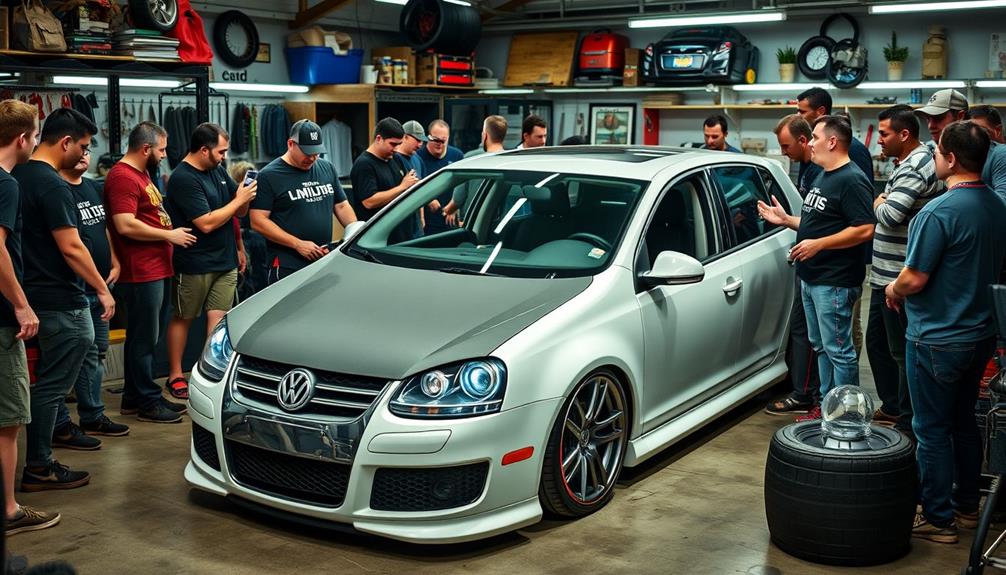
The TDI community provides a treasure trove of resources and support for 2009 Volkswagen Jetta owners, with over 31.2K threads focused on tuning and performance enhancements.
By tapping into these community resources, you can find valuable information and inspiration for your tuning journey. Here are some key resources to explore:
- TDIClub Forums: Engage in discussions about specific tuning options, successful modifications, and best practices that can elevate your Jetta's performance.
- Experience Sharing: Community members often share their hands-on experiences with various tuning products, helping you make informed decisions about upgrades.
- Picture Galleries: Browse through galleries showcasing modified Jettas to inspire your own customization and spark ideas for enhancements.
- Local Meet-ups: Connect with fellow Jetta enthusiasts in your area through regional discussions, allowing you to share resources, advice, and even enjoy meet-ups.
Utilizing these community resources can't only improve your Jetta's performance but also foster connections with like-minded individuals who share your passion for tuning.
Immerse yourself, and you'll find a supportive network enthusiastic to help you along the way!
Frequently Asked Questions
How Much Does It Cost to Get a Tune up on a Volkswagen Jetta?
Getting a tune-up for your Volkswagen Jetta typically costs around $500, including labor. Custom options might add to that, and aftermarket parts can increase expenses, so it's wise to compare prices before deciding.
How Can I Make My VW Jetta Faster?
Think of your VW Jetta as a canvas; to make it faster, you'll fine-tune the engine, install a cold air intake, upgrade the exhaust, and lighten those wheels. Each tweak paints a masterpiece of speed.
Can You Mod a VW Jetta?
Yes, you can definitely mod your VW Jetta! Explore performance upgrades like engine tuning, cold air intakes, and exhaust systems. You'll also find suspension kits and aesthetic mods to enhance both style and handling.
Is the Jetta Underpowered?
If you're feeling the Jetta's lack of power, you're not alone. Many drivers deem it underwhelming, especially when pushing for performance. A few upgrades can definitely transform your driving experience into something more exhilarating.
Conclusion
As you consider diving into the world of tuning your 2009 Jetta, remember that each upgrade opens the door to a new driving experience. Will you choose performance enhancements that release its true potential, or will striking aesthetic changes be your focus? Whatever path you take, the thrill of transformation awaits. Don't just dream about it—take the leap and discover what your Jetta is truly capable of. The journey to revamping your sedan is just beginning.




